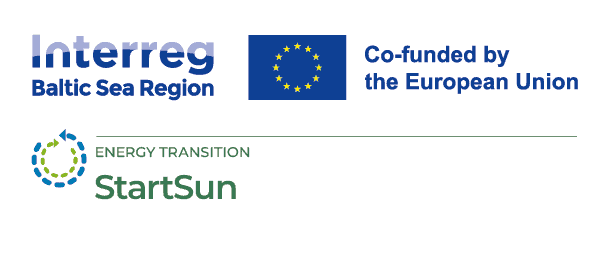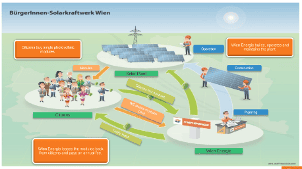
Case Study #8: OurPower (Austria)
08 October 2024
Author: Zemgale Regional Energy Agency
Keywords: Peer-to-peer (P2P), online marketplace, crowdfunding
Overview
OurPower is an energy cooperative that was founded in Vienna in 2018, aiming to engage citizens in the electricity market. With nearly 900 members and 1100 clients, it now operates a platform connecting more than 300 private electricity producers with consumers. OurPower uniquely combines the functions of an energy community and a supplier, including households with solar PV systems, SMEs, and small-scale renewable energy producers like farmers with PV, wind, hydro, and bioenergy installations.
Legal from
In Austria, Renewable Energy Communities operate as cooperatives, driving local renewable energy initiatives. The legal framework supports two models that allow for diverse organizational structures: (1) geographically confined Renewable Energy Communities and (2) broader Citizens’ Energy Communities. Oversight from the Austrian Coordination Office for Energy Communities ensures compliance and fosters growth. While participation of public entities is not supported by the Renewable Energy Sources Act, they play vital roles as facilitators and stakeholders in Austria’s energy sector.
Technological setup
OurPower promotes various renewable energy technologies, including small wind farms, hydropower plants, and solar panels. Solar panels are installed both on rooftops and ground mounted. Rooftop installations, ranging from small-scale (10 kW, 20 kW) to large-scale (up to 4 MW), are connected individually to the grid. Ground-mounted solar panels are also connected to the distribution system. This decentralized approach maximizes renewable energy usage and grid resilience.
Governance
In OurPower, roles and responsibilities are determined democratically, with each member having an equal say through a “one person, one vote” principle. While a managing body oversees operations, ultimate decision-making power lies with the members. The cooperative operates under specific contracts and agreements, particularly as an energy supplier, managing settlement and billing on behalf of its members. Membership is open to additional participants, with transparent procedures outlined for joining and leaving. Technical maintenance of the project, including energy management systems and infrastructure upkeep, is managed by OurPower as the service provider.
Key staff involved in the operations include two leaders and ten employees, with tasks divided among technical, customer support, marketing, and community management teams. Staff work full-time or part-time, with workload distribution reflecting the organization’s needs. The technical team focuses on improving the P2P platform and managing settlements, while the marketing and community management teams work to engage and motivate members to support regional energy initiatives.
Business model
The success of OurPower’s business model rests on crowdfunding and community engagement. The economic feasibility was especially evident high when the electricity prices were high. Main energy consumers include households and SMEs. The cooperative directly engages with electricity retailers; purchase and sale of electricity are facilitated through its online marketplace. Agreements on cost and revenue sharing exist among cooperative members, ensuring fair distribution. For example, energy producers set the price at 13 cents per kWh, while households pay 18.5 cents per kWh, with costs, risks, and cooperation fees accounting for the difference. Additionally, grid fees and other operational costs are factored into the bills for households also.
Digital tools
The OurPower community is developing and testing the serve-U app, which optimizes electricity consumption by providing real-time weather and generation data to its users. This app would enable members to visualize their energy production and consumption, nudging them to adjust their demand accordingly. While there are no specific local energy management systems in place currently, the Serve-U app represents a potential future solution to enhance energy management within the community.
The billing process involves data exchange through OurPower’s digital platform. Future improvements may incorporate additional smart devices to further enhance energy efficiency and data monitoring. Overall, OurPower emphasizes digital networking and continuously improves the functionalities of its digital platforms.
Social inclusion
OurPower highlights the importance of having a diverse and inclusive representation in the energy transition, with a focus on engaging women and young people. While specific details about gender ratios or technical skills of leaders are not provided, the cooperative values try to ensure equal representation. OurPower indirectly addresses energy poverty by promoting sustainable solutions and increasing access to affordable and clean energy. Through hosting events, surveys, and online dialogues, OurPower aims to inform, engage, and empower participants, fostering collaboration and knowledge sharing to support cooperation and the common good.
Barriers and challenges
Establishing the energy community faced challenges from knowledge gaps in regulations and technical requirements. Expert collaboration addressed these issues. Transparent communication by energy community leaders ensured all members were well-informed.
Financial barriers were mitigated through crowdfunding and member investments. Dependence on entities like municipalities and DSOs posed challenges due to their authority and expertise, requiring time-consuming negotiations. Educating policymakers about the energy community’s benefits and logistics was crucial for gaining support and overcoming regulatory hurdles. Advocacy efforts and educational materials addressed these knowledge barriers.
Additionally, OurPower faced challenges in motivating people to purchase energy from regional producers, given the low market prices. Efforts focused on attracting consumers who prioritized supporting the region, despite potentially higher prices. Regulatory challenges included the timing of legislative implementation and discrepancies between the energy community concept and Austrian regulations.
OurPower’s model is distinct among Austrian energy communities, as it provides continuous energy supply from various sources in addition to relying on real-time production.
The image shows a scheme where residents purchase individual solar panels that are installed and maintained by Wien Energie. Residents receive annual compensation from Wien Energie for renting the panels, and the company is responsible for all operation and maintenance of the solar plant. In this scheme, the OurPower cooperative acts as an intermediary or platform that helps citizens join forces and invest in solar projects. The cooperative will coordinate the purchase of solar panels, help organize the signing of contracts with Wien Energie and manage the residents’ investment, ensuring that they receive the intended remuneration for renting the panels. The cooperative helps its members access such projects by promoting joint investment and participation in renewable energy production.
References
Zapreva, S., Stadler, J., & Hammerling, R. 2015. Mit der Kraft der Sonne. Social Identities, 21(6), 10.1365/s40702-015-0155-z.






